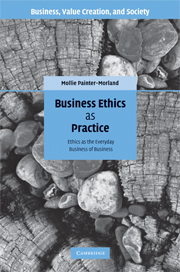Book contents
- Frontmatter
- Contents
- List of tables
- Preface
- Foreword
- Acknowledgements
- 1 Introduction: the dissociation of ethics from practice
- 2 Reconsidering approaches to moral reasoning
- 3 Moral agency reconsidered
- 4 Reconsidering values
- 5 Leadership and accountability
- 6 Reconsidering ethics management
- Index
- References
2 - Reconsidering approaches to moral reasoning
Published online by Cambridge University Press: 22 September 2009
- Frontmatter
- Contents
- List of tables
- Preface
- Foreword
- Acknowledgements
- 1 Introduction: the dissociation of ethics from practice
- 2 Reconsidering approaches to moral reasoning
- 3 Moral agency reconsidered
- 4 Reconsidering values
- 5 Leadership and accountability
- 6 Reconsidering ethics management
- Index
- References
Summary
Many business ethicists seem to work from the assumption that individuals' behavior is informed by deliberate moral decisions. Their efforts are therefore often directed at helping people make better moral decisions by teaching them appropriate reasoning skills. Ethics training courses and university curricula therefore typically introduce people to philosophical paradigms, in which “rational” principles or “objective” procedures form the basis of morality. The role that these paradigms continue to play in people's perceptions and understanding of ethics is problematic, because they effectively enforce a distinction between theory and practice. This contributes significantly to the dissociation of ethics from business practice.
The distinction between theory and practice that is evident in many business ethicists' understanding of morality has a long history. One can argue that it has its origins in the seventeenth century, when philosophers began to explore various forms of universalism and instrumentalism in moral theory. At the dawn of the Enlightenment, slogans like “Aude sapere!” or “dare to know!” carried the day. Individuals were encouraged to use their capacity for reason in the formulation of moral rules, instead of simply deferring unthinkingly to the authority of the church or state. Some seventeenth-century moral philosophers came to see ethics less as a responsive sort of practical judgment, and more in terms of an effort to rationally formulate and objectively apply universal, a priori principles. Others argued that ethical decisions had to be based on a rational, unbiased assessment of the anticipated effects of all available courses of action.
- Type
- Chapter
- Information
- Business Ethics as PracticeEthics as the Everyday Business of Business, pp. 50 - 93Publisher: Cambridge University PressPrint publication year: 2008

